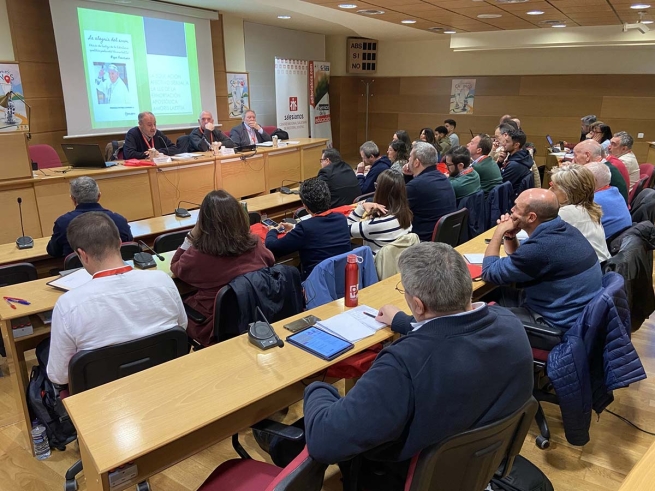According to Fr. José Miguel Núñez, Director of the CNSPJ, this is a "necessary and urgent topic for reflection." In his opening remarks, Fr. Núñez said that "the current context is challenging us and as a Church, we must continue to mature reflection to be influential, to accompany and enlighten adolescents and young people." That is why he encouraged the development of a proposal for affective-sexual education that "is born from Jesus, from the Gospel, and can dialogue with the current culture, without losing the feeling with the Church."
In this feeling or sensing with the Church, the words of Bishop Arturo Ros, auxiliary bishop of Valencia and President of the Subcommission for Childhood and Youth of the Spanish Bishops' Conference, can also be quoted. For the prelate, in this educational-pastoral reflection and proposal on affective-sexual education, "we need to wake up," and ecclesial institutions must be asked to "contribute with creativity, to be attentive to reality," to offer young people a response that is articulated around three axes: accompaniment, affection, and teaching to love starting from the Gospel.
For this reason, he called for strengthening the pastoral care of listening, of being in the midst of the lives of adolescents and young people. He insisted on the need to educate them in affection, "because they also need affection, real affection, not manipulation," and emphasized that it is necessary to "teach them to love, and to know that they are loved, by arousing and accompanying processes, not by imposing paths."
The first talk of the day was given by Jesuit Father Pablo Guerrero, who spoke about how Pope Francis' apostolic exhortation Amoris Laetitia illuminates affective-sexual education. From this perspective, he highlighted several ideas, already present in the texts of the Second Vatican Council, to recover the value of the body and a positive look at affective and sexual language. He recalled how the Pope insists that, within families, it is necessary to "strengthen the education of children," a gradual education, so that they grow "in their capacity to love" and to express that love.
The day continued with a panel discussion, moderated by Salesian Fr. Koldo Gutiérrez, which was attended by Dominican sexual therapist Fr. Cosme Puerto, Salesian Orientation Coordinator of the Spain-Saint James the Greater (SSM) Province, Irune López, and Salesian Orientation Councilor of Triana, Sofía Velasco. The three stressed that affective-sexual education is still an unresolved issue in the Church, reiterating the fundamental but subsidiary role of schools together with families, who are the first and foremost persons responsible for their children.
In the afternoon, COPE journalist Ángel Expósito interviewed Amelia Valcárcel, philosopher and writer, professor at the University of Oviedo, who in an entertaining exchange with the interviewer addressed various issues on the sexual condition of human beings, the "anomie" (absence of rules) that currently exists on this issue and is reflected in the current laws on gender policies, the perverse influence of pornography in childhood, ethical education in the family and classroom through example, and the clear difference between feminism and queer theory.
Finally, Javier de la Torre, a professor at the University of Comillas, addressed how to guide the affective-sexual education of adolescents and youth from a Christian perspective. He turned to the Gospel, discovering in Jesus an absolute acceptance and respect for children, a treatment of women that was respectful of their dignity and more advanced than that of the time, an attempt to rebuild families, and a merciful attitude focused on people and not on rules. He concluded by stressing that, on this sensitive issue, adolescents and young people need adults, their closeness, and especially their example.
In conclusion, Fr. Núñez commented, "It was a splendid day, with first-rate speakers, excellent interventions, and a very good participation on the part of educators from different Church environments. From what we have reflected, we are convinced that we need to continue maturing an educational approach that, from within the culture we inhabit, can emerge from Christian anthropology; with the vocation to influence, enlighten and accompany the growth and maturation of balanced and happy people."
"I am sure that the different perspectives from which we reflected during the day helped enrich our vision and will stimulate us to continue to mature concrete proposals and itineraries," he said in closing.


